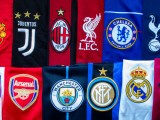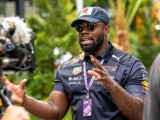Football fans of all ages will be familiar with the voice of Clive Tyldesley. From Champions League finals to FA Cup classics, the iconic commentator has narrated countless memorable moments over the years.
Clive was ITV's senior football commentator for more than two decades before joining CBS Sports in 2020. The four-time Royal Television Society Sports Commentator of the Year has also worked for the BBC, while video game fanatics will remember his time as the voice of FIFA.
We were fortunate enough to chat with Clive about his remarkable career, what's changed in the broadcasting industry over time, the recording process with EA Sports and much more.
Sit back and enjoy our exclusive interview with Clive Tyldesley.
Q. How did you get into commentating and what was your first broadcasting job?
"I pursued it, knocked on doors and fortunately for me, one opened just as I was graduating from university."
A. I got into my dream job, the only job that I've ever wanted to do, a long, long time ago, and the entry roots into broadcasting were very different. I mean, we're talking about the late 1970s when I got my first chance in commercial local radio straight from university.
I often say an ambition is not like a possession. It's not just like an iPhone or something. You've gotta pursue your ambitions with a certain amount of conviction. Be proactive, show what you're capable of.
In the days before the internet and media courses being standard in universities with fantastic broadcast studios and linkups, you had to kind of create your own CV and, yeah, it was what I most wanted to do, so I pursued it, knocked on doors and fortunately for me, one opened just as I was graduating from university.
When I was graduating, when I was leaving school to go to university, I think there were three media courses in the entire UK, and there are now three or more in each university.
Q. Which broadcasters did you take inspiration from when you were getting into the industry?
"A lot of the people that I listened to and wanted to emulate worked for the BBC."
A. It was a very different media landscape back then. The BBC were the dominant force in major television broadcasting, and radio for that matter.
So, inevitably, a lot of the people that I listened to and wanted to emulate worked for the BBC, and because there was far less live sport on television, the voice of a particular sport was very quickly established.
You know, if the commentators in the country were handing over to the man with the microphone as the Grand National runners came across the Melling Road, it was always Peter O'Sullevan. If there was a Wimbledon final, it was always Dan Maskell. If the players were coming down the stretch in an Open Championship, it was always Henry Longhurst, and then Peter Alice.
Because of the amount of live sports content that there is out there now, and nearly everything is covered in nearly every sport, you don't have those established voices.
I think the relationship with the viewer or the listener is very different today. I don't think the commentator is as important, right? Because people don't consume their live sport in the same way as they did when I was young.
When there was one screen in the house, multi-generations would gather round to watch the conclusion, for instance, of the fifth Ashes Test, but now people watch it on the move. They watch it on catch-up. They watch it in communal situations, you know. Sports bars of one kind or another are kind of standard fare for Premier League football, so the commentator isn't as important.
The relationship between the commentator and the audience is nothing like as strong, and so it's very difficult to build up the same kind of trust and respect and kind of adoration that I had for my commentary heroes as a youngster.
Q. What have been the biggest changes in the industry over the years? Obviously, technology has had a massive impact, but what has changed most throughout your career?
"The last three years have been the most uncertain that I've known."
A. One of the delights of the business, and one of the challenges of the business, particularly for a senior figure such as myself, is that communication changes by the day.
Sports broadcasting is only part of a wider picture of how we communicate with one another. I spoke to some students a couple of months ago and just sort of heard myself saying that I've been on the planet a million years, and all I can tell you is that the last three years have been the most uncertain that I've known.
We've never had a worldwide pandemic, which has brutally killed millions of people. We've never had a brutal war two hours flight from Heathrow, taking place in my lifetime. We've never had the economic upheaval, and so on. And until fairly recently, we didn’t have a social media that was as powerful and as influential as it is.
I think it's almost started to become a bit of a monster, which is fudging the way that we are used to gathering our information. Obviously, that is far more important in terms of world news, in terms of the influence that people like Trump and Johnson have had on our lives in the last few years, and you can tell from the tone of my voice what I think of the influence that those two and several others have had! But it puts pressure on good communicators to get to the bottom of the story.
That may sound like a very unwieldy kind of answer to this simple question that you asked me, but it's almost as important for a football commentator as it is for a frontline reporter in the war zone in Donbas at the moment. Because in a weird sort of way, crazily, football has a bigger influence on the lives of so many millions of people than stories that really, they should be taking more notice of.
Q. With that in mind, would you say that your job is now harder or easier compared to when you first started out?
"I hear a lot of commentators today who I don't think improve. I'm not sure that they listen back to their work and review it."
A. Well, there's more jeopardy. I mean, I could say something in the next five seconds that could end my career. I'm not going to, at least I don't think I am, but you never know! There is more jeopardy. There is more exposure.
There is more... I was going to say analysis. I actually think there's less analysis of what constitutes good broadcasting.
I care a lot about the business that I'm in because it's the business I always wanted to be in. We don't save lives, we don't affect the gross national product of the country, it's not really that important. We shout footballers’ names out. But thousands and thousands, probably millions of people want to do the job.
I've always had my favourite commentators and commentators I can't stand, and they'd probably be different from you, but now we can Tweet about it. Before you know it, those views are seized upon by Mail Online or whoever is capable of magnifying and exaggerating the views out there, so there is definitely more jeopardy.
I see commentators doing four or five games a week. I'm not sure how you can prepare properly for four or five games a week, but if it's an economic necessity or if their company requires them, then I guess they've got to do that.
We're all a matter of opinion and my opinion doesn't matter any more than yours or your granny's or the guy who's about to walk past your window. We're all one viewer, one listener, but obviously, my opinion is very considered and I give a lot of thought to what constitutes good and bad commentary. I hear a lot of commentators today who I don't think improve. I'm not sure that they listen back to their work and review it.
I had a mentor who I didn't appoint. He decided he was gonna take me on as a case. It was tough love. He analysed everything I did and gave me feedback. Quite a lot of it was unfavourable, but I do think I owe him everything really. 95% of what I think I know about this job I learned from him. I don't think there's a lot of that going on at the moment.
I think there's an awful lot of content. I think a lot of it is very ordinary. I think some of it is really poor. I think there are a lot of people working in the profession who are not really asking themselves what's required of them, what the job constitutes, you know, what the end game is here in communication.
I feel quite passionately about what I detect to be a drop in the standard of communicating generally. I don't think that comes from the pressure of social media. I think it just comes from there being too much out there, which not enough people really care about, to be honest. I sound very sad, and maybe I sound like some old grump who should shut up and retire, but I won't because I do think it's important.
And when I hear good work, I make damn sure I get in touch with the person involved, and tell he or she, by the way, I thought that was really good. And you know what, they really appreciate it.
Q. You were the voice of the FIFA video game for the best part of a decade. What was the recording process like and what went on behind the scenes?
"I tried to schedule it at a time when I didn't have a lot of live football coming up because my voice needed a little bit of time to recover."
A. It's extremely dull. It's kind of almost as hard as I've ever worked really.
FIFA has always been made by EA in Vancouver in Canada. I've been out to Vancouver to deliver workshops to the programmers and people who work on the product because when I inherited it from John Motson, the script was very kind of pan-American.
There were goal tenders and goal minders and I tried to convince them that the script was really important because even though it's a visual medium, rather like television, the commentary is only ever a soundtrack to it. It actually should not be a distraction. It should almost just be a comfort blanket that you have on in the background.
For instance, if there was a line in the script about bursting the onion bag, my argument was always - okay, very funny, but if you play FIFA for six or eight hours constantly, the thirteenth time you hear it, you throw something at the screen. What you want is actually a television commentary, so I rewrote the entire script and actually toned it down a little bit, and I told them to improve their gameplay because, at the time, Pro Evo was considered to be a better game to play for the gamer.
I wrote the scripts and I always liken it to a family tree. You start with a corner kick, and then you have a long corner and short corner, and these are sort of building out into families. And then you have maybe a higher and a low one, or a good and a bad one, but all the time this side of the tree is building
I used to have Andy Townsend with me a lot of the time, so we could have a laugh about it. The same guys came over from Vancouver twice a year to record, but I felt knackered at the end of a session, particularly at the end of the week. I used to try to avoid having a game at the weekend if I'd done a full week of recording for EA. I tried to schedule it at a time when I didn't have a lot of live football coming up because my voice needed a little bit of time to recover.
Q. Do you have a favourite moment from your career?
"I think it's a great motivation for a commentator to make the next game the most important game they've ever done."
A. The glory of football is that it belongs in its moment. It actually captures moments in our lives. There are very few other things in life that actually diarize your life for your nostalgia cells to zoom in on when you become old and withered like me.
You can't compare a game that was played when you were 12 to a game that you watched last year. They arouse different emotions in you, and they represent different things in your memory bank and in the story of your life.
I think it's a great motivation for a commentator to make the next game the most important game they've ever done. The next game you commentate on may be the most important game of the season for some of your viewers and listeners, and so even if you did a Champions League game two days ago and now you're doing a League Two game or an FA Cup first-round game or something of that nature, your motivation should be that this is as important.
It's great to have those Champions League finals on my CV, which were watched by 20 or 25 million people. And yeah, people still come up to me and talk about where they were that night, in 1999 and 2005 and so on and so forth. But to me, as the guy who's actually delivering some of the memories which they attach to those occasions, I've gotta be focused on that next match. It's got to be the most important game of my career.
Q. When there is a big moment in a match, do you feel pressure as the commentator to deliver the perfect line?
"The pressure that you talk about with the big moments is in fact an opportunity."
A. Well, it's a test of concentration more than anything. Once you reach a certain capability as a commentator, there is a difference between being able to commentate and actually leaving your audience with something to remember it by.
Particularly in television commentary, you're not describing the action, you're trying to augment the action, you're trying to embroider it, you're trying to embellish it. You're trying to find the journalism, the editorial relevance of what you're seeing.
If you are a commentator, it should be important to you to try to make it as good as it can be. I don't think enough commentators out there are making that effort at the moment, and they're letting themselves and their opportunities down.
So, the pressure that you talk about with the big moments is in fact an opportunity. It is exactly what that player on the field has got. It's a chance. Yeah, if you miss the chance, you may be remembered for that, but if you score the goal, you'll definitely be remembered for that.
The majesty of Martin Tyler's Aguero goal is not when he shouts “Aguerooo”, it's what he says next. It's something like, “I swear you'll never see anything like this again”. Now, that's a big shout to make in the moment, and we're talking about a guy who's seen it all, you know, a really, really experienced broadcaster. But he was right. We wouldn't.
I think the drama of football is actually in the action rather than the words. It's capturing the right words and words which are distinctive enough to belong to that moment.
Stick around for more exclusive interviews and Sports Streams News from Sporticos.












